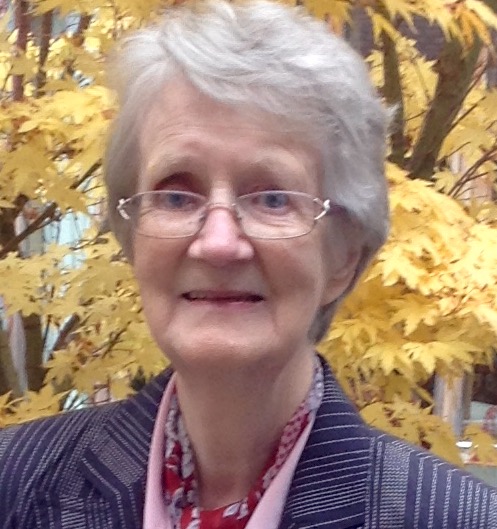September 24, 2018
Mercy Day
This Above All Is Precious and Remarkable
This above all is precious and remarkable,
How we put ourselves on one another’s care,
How inspite of everything we trust each other.
Fishermen at whatever point they are dipping and lifting
On the dark green swell they partly think of as home
Hear the gale warnings that fly to them like gulls.
The scientists study the weather for love of it,
And not specifically for love of the fishermen,
And the wireless engineers do the transmission for love of wireless.
But how it adds up is when the terrible white malice
Of waves as high as cliffs is let lose to seek a victim,
The fishermen are somewhere else, and so not drowned.
And why should this chain of miracles be easier to believe
Than that my darling should come to me as naturally
As she trusts a restaurant not to poison her.
They are simply examples of well-known types of miracle.
The two of them,
That can happen at any time of day or night.

John Wain (1925-1994) journalist, novelist, literary critic and for a time Professor of Poetry at Oxford was one of a group of 1950s writers who were radically opposed to British conservatism and class-system. He was a friend of C.S.Lewis from his time as a student in Oxford when Lewis was his tutor. Like Lewis, he was a gregarious and clubbable man, and like him also had a curiosity about life and a sturdy down-to earth manner. But he did not share Lewis’ medieval interests, his interest in the literature of fantasy, nor Lewis’ religious faith. The premise of his writings is that human goodness and love will outlast violence and brutality.
I chose this poem, simply because I return to it again and again. With its long rambling lines and sprawling awkward metre, the poem gathers us into an experience that is quite messy and could go awry. As the rolling wave-like motion of the lines suggest, we can clamber about in the sea of life in isolation from each other. We ask: is this what life is about? Is this all there is? The poet firmly says ‘no’. In the strong and beautiful first lines he announces the shining jewel that is centre of the poem - that of trust. Despite appearances to the contrary, trust is there as the gift of unity pervading all things. Beyond our human expectations, it comes to us as miracle And is always there to be called upon, especially in those most vulnerable of moments when the other comes toward me in love.
In another poem, Apology for Understatement, the poet gives a short apologia for his style of writing, and castigates ‘Verse … dressed that has nowhere to go.’ Wain’s style is anything but ‘dressed up’. But it does go somewhere. It invites us into the miracle of trust bequeathed on us by the universe. It pleads with us not to separate from it into our so-called ‘specialness’. And it implies that in living within the miracle, we will have ‘somewhere to go.’
Sr Jo O’Donovan
Limerick.
 Sr Jo writes; ' I have always been a poetry lover, and assembled my own personal anthology over the years. My work has been in the areas of religious education and theology to student teachers and arts students in Mary Immaculate College, Limerick. But the poetry was always there, because sometimes the religious issues raised called for the language of the poet. Such language frees us up to an alternative knowledge, and writing this bio has moved me to reminisce. I think the desire for this different knowledge was from my father. He was a quiet country man who loved the land and his small fields and he retired most evenings after work to a quiet place in the house with his limited treasury of books, to read and to pray. In his household of women – Mam and five girls – he was a reservoir of mystery, especially when at times he prayed out loud. My small sisters were awestruck and filled with wonder.‘Dad is praying’, they said. Indeed, the experience of Dad praying came to me when once I read in the Islamic tradition that when Abraham, the great father in faith for Muslims, prayed out loud to Allah, the heavens and earth were shaken. And I, the eldest, as I prepared for Leaving Cert with plans to go to college, wasn’t even curious about his reading. I thought the books looked so old compared to my shiny new ones. He died soon after I entered and before I really got to know him. But I think he left me with the ‘blur’,that incapacity to be satisfied with a purely rational knowledge. Patrick Kavanagh says we need to trust the ‘blur’ as a way of knowing. With the ‘blur’ we are returned to ‘the animal remembering brain’, which, as Kavanagh says, is the source of poetry.'
Sr Jo writes; ' I have always been a poetry lover, and assembled my own personal anthology over the years. My work has been in the areas of religious education and theology to student teachers and arts students in Mary Immaculate College, Limerick. But the poetry was always there, because sometimes the religious issues raised called for the language of the poet. Such language frees us up to an alternative knowledge, and writing this bio has moved me to reminisce. I think the desire for this different knowledge was from my father. He was a quiet country man who loved the land and his small fields and he retired most evenings after work to a quiet place in the house with his limited treasury of books, to read and to pray. In his household of women – Mam and five girls – he was a reservoir of mystery, especially when at times he prayed out loud. My small sisters were awestruck and filled with wonder.‘Dad is praying’, they said. Indeed, the experience of Dad praying came to me when once I read in the Islamic tradition that when Abraham, the great father in faith for Muslims, prayed out loud to Allah, the heavens and earth were shaken. And I, the eldest, as I prepared for Leaving Cert with plans to go to college, wasn’t even curious about his reading. I thought the books looked so old compared to my shiny new ones. He died soon after I entered and before I really got to know him. But I think he left me with the ‘blur’,that incapacity to be satisfied with a purely rational knowledge. Patrick Kavanagh says we need to trust the ‘blur’ as a way of knowing. With the ‘blur’ we are returned to ‘the animal remembering brain’, which, as Kavanagh says, is the source of poetry.'
Poetry commentary previously published on mercyworld.org:
* Spring and Fall: To a Young Child by GM Hopkins sj